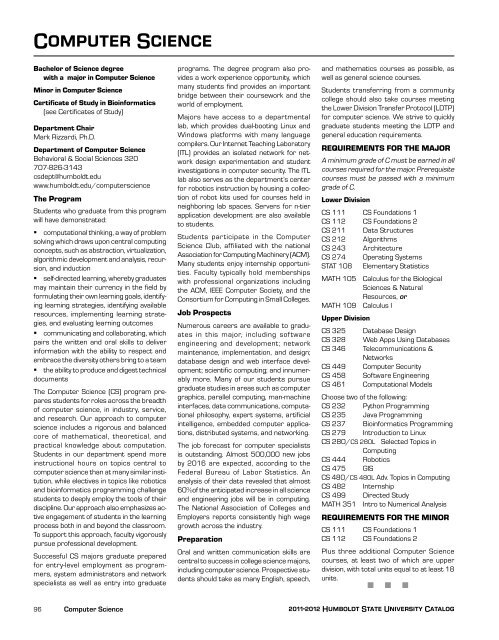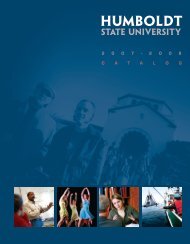2011-12 Academic Year - Bad Request - Humboldt State University
2011-12 Academic Year - Bad Request - Humboldt State University
2011-12 Academic Year - Bad Request - Humboldt State University
Create successful ePaper yourself
Turn your PDF publications into a flip-book with our unique Google optimized e-Paper software.
Computer Science<br />
Bachelor of Science degree<br />
with a major in Com pu ter Science<br />
Minor in Com pu ter Science<br />
Certificate of Study in Bioinformatics<br />
(see Certificates of Study)<br />
Department Chair<br />
Mark Rizzardi, Ph.D.<br />
Department of Computer Science<br />
Behavioral & Social Sciences 320<br />
707-826-3143<br />
csdept@humboldt.edu<br />
www.humboldt.edu/computerscience<br />
The Program<br />
Students who graduate from this program<br />
will have demonstrated:<br />
computational thinking, a way of problem<br />
solving which draws upon central computing<br />
concepts, such as abstraction, virtualization,<br />
algorithmic development and analysis, recursion,<br />
and induction<br />
self-directed learning, whereby graduates<br />
may maintain their currency in the field by<br />
formulating their own learning goals, identifying<br />
learning strategies, identifying available<br />
resources, implementing learning strategies,<br />
and evaluating learning outcomes<br />
communicating and collaborating, which<br />
pairs the written and oral skills to deliver<br />
information with the ability to respect and<br />
embrace the diversity others bring to a team<br />
the ability to produce and digest technical<br />
documents<br />
The Computer Science (CS) program prepares<br />
students for roles across the breadth<br />
of computer science, in industry, service,<br />
and research. Our approach to computer<br />
science includes a rigorous and balanced<br />
core of mathematical, theoretical, and<br />
practical knowledge about computation.<br />
Students in our department spend more<br />
instructional hours on topics central to<br />
computer science than at many similar institution,<br />
while electives in topics like robotics<br />
and bioinformatics programming challenge<br />
students to deeply employ the tools of their<br />
discipline. Our approach also emphasizes active<br />
engagement of students in the learning<br />
process both in and beyond the classroom.<br />
To support this approach, faculty vigorously<br />
pursue professional development.<br />
Successful CS majors graduate prepared<br />
for entry-level employment as programmers,<br />
system administrators and network<br />
specialists as well as entry into graduate<br />
programs. The degree program also provides<br />
a work experience opportunity, which<br />
many students find provides an important<br />
bridge between their coursework and the<br />
world of employment.<br />
Majors have access to a departmental<br />
lab, which provides dual-booting Linux and<br />
Windows platforms with many language<br />
compilers. Our Internet Teaching Laboratory<br />
(ITL) provides an isolated network for network<br />
design experimentation and student<br />
investigations in computer security. The ITL<br />
lab also serves as the department’s center<br />
for robotics instruction by housing a collection<br />
of robot kits used for courses held in<br />
neighboring lab spaces. Servers for n-tier<br />
application development are also available<br />
to students.<br />
Students participate in the Computer<br />
Science Club, affiliated with the national<br />
Association for Computing Machinery (ACM).<br />
Many students enjoy internship opportunities.<br />
Faculty typically hold memberships<br />
with professional organizations including<br />
the ACM, IEEE Computer Society, and the<br />
Consortium for Computing in Small Colleges.<br />
Job Prospects<br />
Numerous careers are available to graduates<br />
in this major, including software<br />
engineering and development; network<br />
maintenance, implementation, and design;<br />
database design and web interface development;<br />
scientific computing; and innumerably<br />
more. Many of our students pursue<br />
graduate studies in areas such as computer<br />
graphics, parallel computing, man-machine<br />
interfaces, data communications, computational<br />
philosophy, expert systems, artificial<br />
intelligence, embedded computer applications,<br />
distributed systems, and networking.<br />
The job forecast for computer specialists<br />
is outstanding. Almost 500,000 new jobs<br />
by 2016 are expected, according to the<br />
Federal Bureau of Labor Statistics. An<br />
analysis of their data revealed that almost<br />
60%of the anticipated increase in all science<br />
and engineering jobs will be in computing.<br />
The National Association of Colleges and<br />
Employers reports consistently high wage<br />
growth across the industry.<br />
Preparation<br />
Oral and written communication skills are<br />
central to success in college science majors,<br />
including computer science. Prospective students<br />
should take as many English, speech,<br />
and mathematics courses as possible, as<br />
well as general science courses.<br />
Students transferring from a community<br />
college should also take courses meeting<br />
the Lower Division Transfer Protocol (LDTP)<br />
for computer science. We strive to quickly<br />
graduate students meeting the LDTP and<br />
general education requirements.<br />
REQUIREMENTS FOR THE MAJOR<br />
A minimum grade of C must be earned in all<br />
courses required for the major. Prerequisite<br />
courses must be passed with a minimum<br />
grade of C.<br />
Lower Division<br />
CS 111 CS Foundations 1<br />
CS 1<strong>12</strong> CS Foundations 2<br />
CS 211 Data Structures<br />
CS 2<strong>12</strong> Algorithms<br />
CS 243 Architecture<br />
CS 274 Operating Systems<br />
STAT 108 Elementary Statistics<br />
MATH 105 Calculus for the Biological<br />
Sciences & Natural<br />
Resources, or<br />
MATH 109 Calculus I<br />
Upper Division<br />
CS 325 Database Design<br />
CS 328 Web Apps Using Databases<br />
CS 346 Telecommunications &<br />
Networks<br />
CS 449 Computer Security<br />
CS 458 Software Engineering<br />
CS 461 Computational Models<br />
Choose two of the following:<br />
CS 232 Python Programming<br />
CS 235 Java Programming<br />
CS 237 Bioinformatics Programming<br />
CS 279 Introduction to Linux<br />
CS 280/CS 280L Selected Topics in<br />
Computing<br />
CS 444 Robotics<br />
CS 475 GIS<br />
CS 480/CS 480L Adv. Topics in Computing<br />
CS 482 Internship<br />
CS 499 Directed Study<br />
MATH 351 Intro to Numerical Analysis<br />
REQUIREMENTS FOR THE MINOR<br />
CS 111 CS Foundations 1<br />
CS 1<strong>12</strong> CS Foundations 2<br />
Plus three additional Computer Science<br />
courses, at least two of which are upper<br />
division, with total units equal to at least 18<br />
units.<br />
n n n<br />
96 Computer Science<br />
<strong>2011</strong>-20<strong>12</strong> <strong>Humboldt</strong> <strong>State</strong> <strong>University</strong> Catalog

















